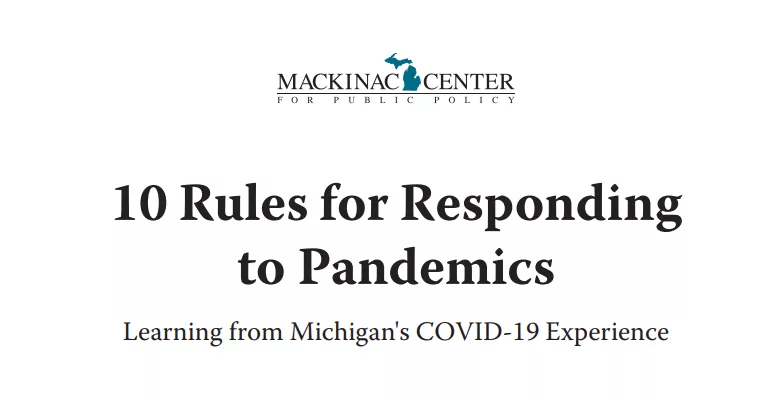Saying they want to help policymakers “navigate the challenges of mitigating the harms of pandemics while protecting the constitutional rights of Michiganders,” the Mackinac Center for Public Policy has issued today a new report that offers 10 Rules for Effective Pandemic Policies.
The new report draws on lessons from Michigan’s experience with COVID-19 thus far, contending that, “The COVID-19 pandemic produced one of the most challenging and controversial years for Michigan policymakers.” The report cities policies such as a stay-at-home order, business and school closures and a statewide mask mandate that had never been used before. Authors of the report imply that, “While the appropriateness of these particular policies will be debated for years, the state’s experience in implementing them provides lessons for how policymakers can more effectively limit the harms of a pandemic.”
The new report provides 10 rules for policymakers that they argue will work to protect the constitutional rights of Michigan residents and simultaneously help mitigate the threat posed by a pandemic, such as COVID-19. The 10 rules in the report are:
- Rule 1: The normal lawmaking process should determine pandemic policies to the extent possible.
- Rule 2: The state should not favor one public health concern at the expense of others.
- Rule 3: State government should not be the arbiter of what is essential.
- Rule 4: Restricting individual rights should always be explicitly temporary.
- Rule 5: The process of restricting constitutional rights must be transparent.
- Rule 6: The state should provide notice of when it plans to restrict civil rights.
- Rule 7: Pandemic policies should be easy to understand and follow a consistent logic.
- Rule 8: Voluntary compliance should be the default approach and buy-in from law enforcement is necessary for any enforcement attempt.
- Rule 9: Statewide rules should come from a consistent source.
- Rule 10: Laws that hinder pandemic responses should be reconsidered for permanent repeal.
The Michigan think tank suggests, “It is important for policymakers to root their pandemic policies in rules such as these. In Michigan and elsewhere, elected officials opted to ignore the prepared pandemic plans created by public health experts and made policy decisions on the fly. This led to confusion and controversy and helped to politicize the state’s effort.”
The report also notes, “These same elected officials routinely declared that their policies were correct and working, even though this was impossible to tell based on the available data. While there is a time and place for the state to use emergency powers to immediately implement certain policies, a more methodical approach would serve Michiganders better.”
Michael Van Beek, Director of Research at the Mackinac Center and author of the report, says, “No matter what you think of the state’s handling of the COVID-19 pandemic, there are lessons to be learned about how these decisions were made,” and contends, “These 10 rules will help policymakers create policies that are consistent, transparent and treat Michiganders fairly. This will help protect the rights of Michiganders while also improving our ability to limit the harms of a pandemic.”
You can view the full report at this link: 10-rules-for-pandemics
The Mackinac Center for Public Policy is a nonpartisan research and educational institute dedicated to improving the quality of life for all Michigan residents by promoting sound solutions to state and local economic policy questions. As a free-market think tank, the Mackinac Center is guided by its belief in free markets, individual liberty, limited government and the rule of law. Founded in 1987, it is headquartered in Midland, Michigan. For more information, visit http://www.mackinac.org






